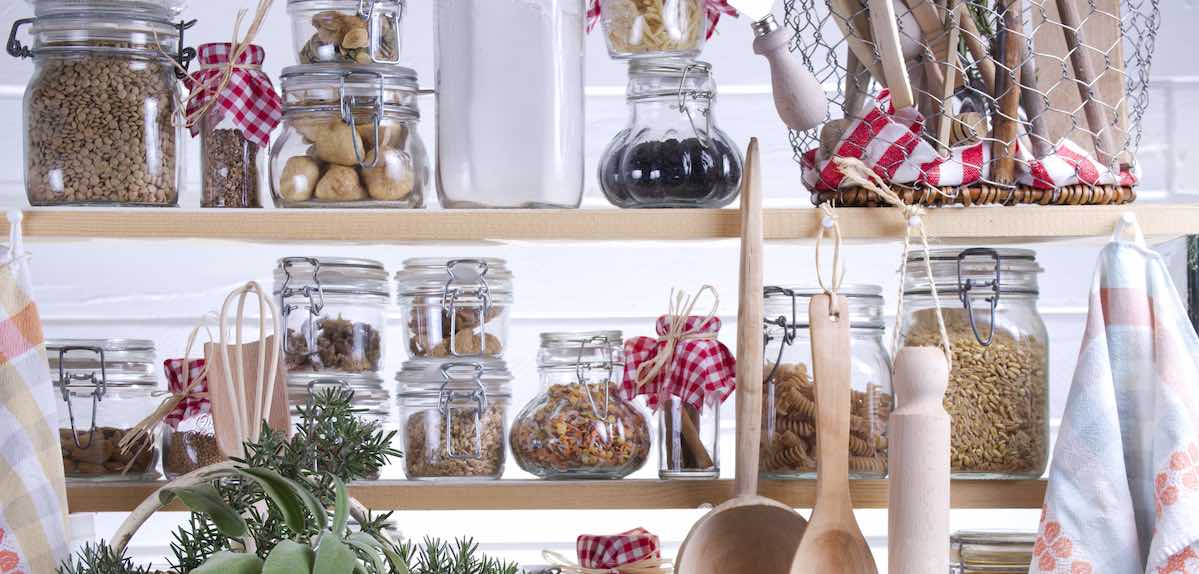Pantry Week is not on any calendar, but if your family is relocating soon, it probably should be. And, Pantry Week does not have to be one of those empty holidays, like National Pipe Cleaner Week or something like that. With some forethought and imagination, Pantry Week could be one of the best weeks on the calendar. You might even want to have one every year whether you are moving or not. Today we will give you 7 Ways to Clean Your Pantry Before a Move.

Clearing Out Your Pantry Before a Move
Meal planning is just one of the many moving planning areas we care deeply about at Green Van Lines. If kids do well on their homework, they usually, although not always, do well on their tests. The same is true of moving and storage. If we plan everything accordingly, the wind is at our back on moving day. This approach has served us well before, and we’re confident it will produce results that exceed your expectations.
Getting Started
Listing your assets is usually the most important part of any plan. Otherwise, how would you know if there is a wheelbarrow or a Holocost Cloak lurking nearby, or what it is in the back of the freezer amongst all the ice shavings? Additionally, taking stock of your assets usually starts your creative wheels turning. You’ll need that creativity later in this post.
When it comes to executing your plan, timing is key. If you go through the list too quickly, you’ll have to restock, which defeats the purpose of clearing out the pantry. At the same time, don’t wait too long, or things will become overwhelming.
Some Recipe Ideas
Of course, no one has the same items in their refrigerator, pantry, or freezer. But here are some ideas for some of the most common things on most lists.
Pasta Uses
Let’s get the inevitable three-can casserole joke out of the way (three cans of whatever is in the pantry and enough Velveeta to hold it together). Random Veggie Pasta Bake is not bad. Combine vegetables and pasta into a cream, cheese, or marinara sauce, and bake. As a bonus, you can make this item, put it back in the freezer for a few days, and it is still good to go.
Using Chips and Cereal
Almost everyone has partially-full bags of tortilla or potato chips in their pantries, along with various kinds of breakfast cereals. Bake them for a few minutes at a low temperature to crisp them up, crush them, and use them for breading chicken or fish. On a related note, the random pieces of wheat and sugar at the bottom of a Shredded Mini-Wheats box make pancakes thicker and tastier.
Using Chicken
Recipes like chicken parmesan and green chile chicken enchiladas sound complex, but they are pretty easy. You could recruit the kids to help you. If they’re the right age, they’ll think that’s cool and they might not burn down your kitchen during the process.
Extra Flower Uses
Buying almond flowers and other such products probably seemed like a really good idea at the time. But now, they merely take up space. Here in Dallas but also when we are moving to Florida, we fry just about everything.
Visit the Texas State Fair one year and you’ll see what we mean. Fried foods aren’t very healthy, but after all, it’s Pantry Week. Additionally, homemade treats like focaccia, tortillas, and bread make good road trip snacks.
Using Oatmeal
Most kids like oatmeal, which means there is probably an awful lot in your pantry. Fortunately, most kids also like oatmeal-related treats, such as muffins, cookies, and granola bars. Oatmeal bake is usually a hit as well

Giving Away Food
Due to some recent changes in government assistance programs, food banks are chronically short supplied. They will gladly take whatever cans you have in your pantry. Giving food away gives you a double benefit. You get rid of it, and it helps someone in need.
Cleaning and Defrosting
Never believe those marketing gimmicks about “frost-free” refrigerators or freezers. Such a product does not exist. Granted, most of these appliances have a time-saving auto-defrost feature. Nevertheless, you should probably set aside an entire day to clean the freezer and refrigerator. Once the defrosting is finished, thoroughly wipe everything down with mild soap and allow it to dry for at least an hour.
Transporting Food
Even if you follow every item on this list, you will probably have some leftover food. Most moving companies do not transport foodstuffs over long distances or allow them in storage areas. Food attracts rodents and a number of other pests.
Always place spillable items, like cooking oil, into resealable bags. When you pack food into small or medium-sized boxes, always put heavy items on the bottom and lighter items on top. Finally, mark the boxes clearly so they do not erroneously end up in the attic.

Dumping Food
Carefully consider if the food is worth taking with you. Normally, you only want to take unopened or nearly-unopened products. Everything else can go. Immediately take out the trash and put it somewhere protected but out in the open. Just don’t use a commercial dumpster, because that’s illegal (wink).
We have lots of other ideas that make the moving day smoother, so reach out to us now.
Moving Food
Packing and moving all the food in your kitchen is tough to work. You need to figure out how to properly pack packaged food without anything breaking, and how to pack appliances for the new house. You must also consider the refrigerator and freezer. Depending on the distance, you may be unable to pack the contents of your fridge successfully.
- Take Inventory – A month before your big move, take a complete inventory of everything in the pantry, refrigerator, and freezer. Indicate which items you can bring and what cannot be packed.
- Meal Planning – If you have a lot, start planning meals with what you have. Focus on the perishables and frozen food first.
- Grocery Shopping – When grocery shopping before the big day, only buy the foods you intend to use immediately. Do not buy anything in bulk and avoid impulse purchases.
- Dry Goods – If you are working with a moving company, they may have policies in place regarding food items. Some dry goods, such as seasonings and spices, may be fine. For everything else, you’ll want to ask your moving company about their policies.
- Dining Out – It’s important to be aware of what you’re eating. During a move, you’ll likely be eating out more often. Some days, you’ll just be too tired to cook. Try to plan ahead and use what you have before resorting to take-out.
Make your upcoming move a breeze with Green Van Lines. Schedule top-rated service by calling 888-770-4733!
